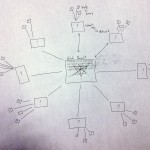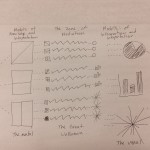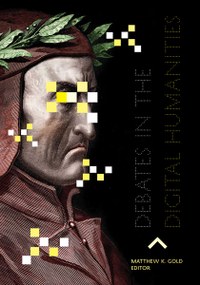Inside Higher Ed has a story by Steve Kolowich about the essays we published in the MLA journal Profession on evaluating digital scholarship. The story, The Promotion That Matters (Jan. 4, 2012) quotes my essay On the Evaluation of Digital Media as Scholarship about how the problem is now how to practically review digital scholarship if you have no experience with it (and are on a tenure and promotion committee.)
It’s interesting how the article begins with what is becoming a trope – that the digital humanities is the new new thing. This time we have no lesser pundit than Stanley Fish proclaiming the arrival of new newness. Kolowich opens the essay (which is mostly about evaluation) by talking about how Fish, the “self-appointed humanities ambassador”, says the digital humanities has replaced postmodernism as the next thing. Its a nice way to open a story on the digital humanities and I suspect we will see more of this opening for a year or two. (What will it mean when people can’t start their stories this way?)
As for Fish, check out his blog post on the MLA, The Old Order Changeth (Dec. 26, 2011). The essay is based on reading the program (rather than attending) and he notices, among other things, all the digital humanities sessions. As he puts it, after reminding us what it was like when postmodernism was the rage,
So what exactly is that new insurgency? What rough beast has slouched into the neighborhood threatening to upset everyone’s applecart? The program’s statistics deliver a clear answer. Upward of 40 sessions are devoted to what is called the “digital humanities,” an umbrella term for new and fast-moving developments across a range of topics: the organization and administration of libraries, the rethinking of peer review, the study of social networks, the expansion of digital archives, the refining of search engines, the production of scholarly editions, the restructuring of undergraduate instruction, the transformation of scholarly publishing, the re-conception of the doctoral dissertation, the teaching of foreign languages, the proliferation of online journals, the redefinition of what it means to be a text, the changing face of tenure — in short, everything.
I’m intrigued by the possibility that the digital humanities might sweep through with the same arrogance that theory did. (Did it?) Is DH the same sort of new new thing? Fish lists some of the symptoms we might see if the digital humanities drives through like another revolution:
Those who proclaimed the good news in 20-minute talks at the convention welcomed the dawning of a brave new world; those who heard them with dismay felt that the world they knew and labored in quite happily was under assault, and they reacted, in counterpoint 20-minute talks, by making the arguments defenders of an embattled regime always make: it’s just a passing fad; everything heralded as new can be found in Plato and Aristotle; what is proclaimed as liberating is actually the abandonment of reason and rigor; a theory that preaches the social construction of everything collapses under its own claims; the stuff is unreadable; it has no content apart from its obfuscating jargon; maybe it will just go away.
I hope Fish is wrong. My hope is that colleagues not interested in the digital realize that we are not threatening to replace other forms of scholarship so much as to extend it. Digital practice does not deconstruct other practices/theories/methodologies, it supplements them and re-engages them. From the perspective of practice one of the things that exemplifies the digital humanities is that it is often experienced in projects that bring together “traditional” scholars and digital humanists rather than develop as a confrontation. Some of the more enthusiastic may think that the digital humanities can replace the practices of the last generation and in some cases the digital humanities does raise new questions, but the history of computing in the humanities has never been confrontational. (Instead, I would argue that the digital humanities has been a little too servile, pretending that all we wanted to do was bring new methods to old problems.) Our disciplinary history is that of a prosthesis or monster stitched from the old and the new. For that reason I doubt we will be the same sort of new new thing that postmodernism was. We don’t pretend to attack the foundations of the humanities so much as to extend them. We need our colleagues rather than despise them. We spend our time reaching outside of the humanities rather than gazing into its navel.
No … the danger is not that the digital humanities will try to deconstruct what came before, but that it introduces a new form of busy-ness to the humanities that distracts humanists from whatever is truly important. (And we all know what that is … don’t we?) The digital humanities is endlessly complicated, especially because it draws limbs from alien fields like the sciences and engineering. DH introduces new jargon, new languages (as in programming languages), new techniques, new practices, and new communal projects. All of this newness will keep us busy keeping up. All this newness will seem too much for many who haven’t the time to embrace something so time-consuming no matter how friendly. Many will keep quiet for fear that others think they are stupid because they don’t get computing when really they haven’t the time to do both the old, the new and the new new. Others will practice some cute put down just like all the cute ways we put down other movements we haven’t the time to master. Most will just feel the hug of the digital is a bit too friendly and a bit too tight. They will wait it out until one day something else will be announced as the new form of new new.
So what do I mean by busy-ness being the danger rather than replacement? Busy-ness is my word for the danger of constant activity Heidegger saw in “The Age of the World Picture” though there is something envious and cynical to his characterization of this technical turn. It is the danger of hyperpedantry when you perform the activities of wisdom faster and faster rather than thinking through wisdom. It really isn’t a new danger (Plato, of course, also warned us about this.) It is the danger that those tired of being left behind warn others about in the hopes they will slow down. It is a danger too often voiced by the grant envious which means we don’t listen too them. Here is Heidegger on it,
The decisive unfolding of the character of modern science as constant activity produces, therefore, a human being of another stamp. The scholar disappears and is replaced by the researcher engaged in research programs. These, and not the cultivation of scholarship, are what places his work at the cutting edge. The researcher no longer needs a library at home. He is, moreover, constantly on the move. He negotiates at conferences and collects information at congresses. He commits himself to publishers’ commissions. It is publishers who now determine which books need to be written.
From an inner compulsion,the researcher presses forward into the sphere occupied by the figure of, in the essential sense, the technologist. Only in this way can he remain capable of being effective, and only then, in the eyes of his age, is he real. Alongside him, an increasingly thinner and emptier romanticism of scholarship and the university will still be able to survive for some time at certain places. (p. 64, from the collection Off the Beaten Track, trans. by Julian Young and Kenneth Haynes.)
Whatever Heidegger says, I believe it is impossible to distinguish between busy-ness and whatever is considered “real work” or real scholarship. The difference is ineffable, but that is not why busy-ness is a danger to the digital humanities. Busy-ness is the danger because it is the other of technical activity. Practical activity is what the humanities needs after theory, but also what it will tire of. At the very moment when we think the digital humanities has made a pragmatic difference we will worry that there is no meaning to all the technique. The digital humanities will not be critiqued as another replacement or another post post; it will exhaust itself and be found empty. The rhetoric will turn to wisdom and away from best practices.







